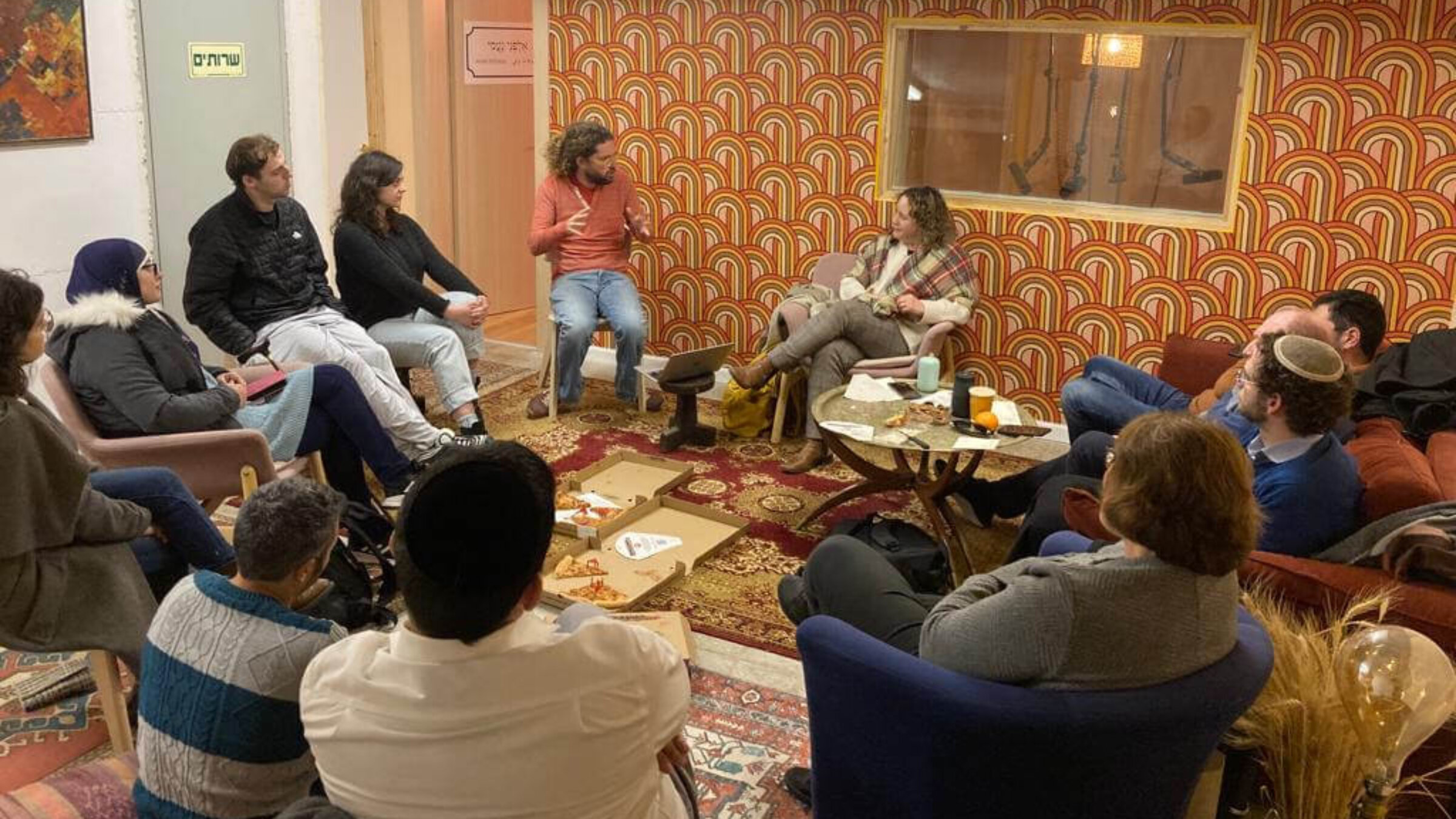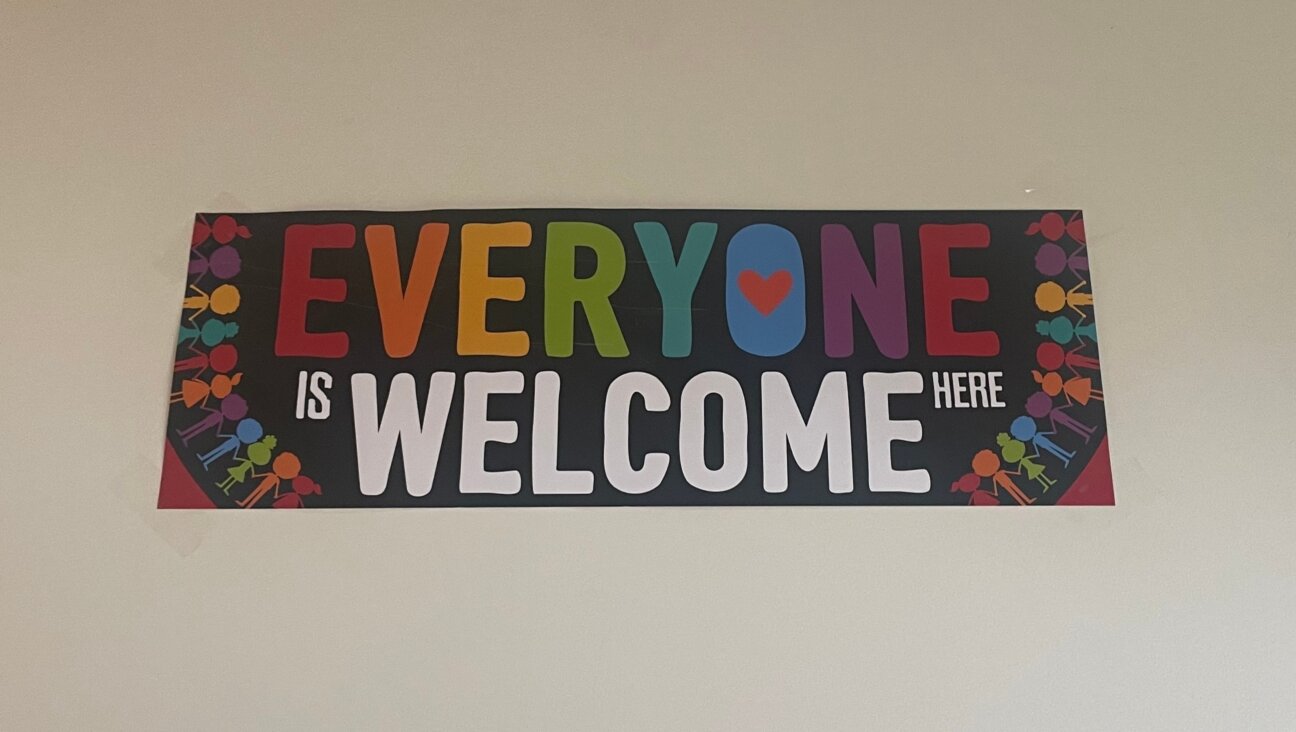Telling Israel’s war story, one voice at a time
The “Wartimes Diary” podcast series provides the most powerful window into life in Israel right now

Mishy Harman, in jeans, talking with his podcast crew at their studio in Jerusalem. Courtesy of Israel Story
An Israeli rapper on reserve duty in Gaza who took a 4-kilo bag of gummy candy for his fellow troops. A 10/7 widow who wanted to talk about sex in her husband’s eulogy. A Druze journalist who was taken hostage by Hamas — 19 years ago.
The man who rescued the cows of Kibbutz Kissiufim. The Santa Claus of Jaffa Gate. The workers at Jerusalem’s biblical zoo, a wartime bride, a 77-year-old poet.
These are some of the characters I’ve met over the past four months through Wartime Diaries, the pop-up podcast series providing the most powerful — and poignant — window into Israel’s war story in real time. And I’m hardly alone — more than 1 million listeners have downloaded at least one of its 44 episodes so far.
“We just sort of decided OK, what we can do is we can interview people who are experiencing the war — we’ll do short interviews, 30 minutes, we’ll cut it down and we’ll release it that day,” explained the show’s chief producer, Mishy Harman. “Understanding that we’ll never be able to explain, you know, the full range of experiences, but maybe we can shed light on different kinds of experiences.”
Harman, who is 40, is the creator, host and senior producer of Israel Story, a narrative series modeled on This American Life that debuted in 2014. Until Oct. 6, it was the world’s most listened-to Jewish podcast, with about 35,000 downloads per episode. Wartime Diaries, which like Israel Story is in English and aimed at the global audience, has dwarfed that, averaging more than 100,000.
(This week, Harman’s team launched a new show, in Hebrew, called Sipur Yerushalmi — Jerusalem Story — based on The Moth-style storytelling events they’ve been hosting in the city for years.)

I’ve known Mishy since I moved to Jerusalem in 2012 as bureau chief for The New York Times — in fact, he told me Thursday that I played a minor but important role in the life of Israel Story. Turns out it was at my welcome party that he first pitched the show’s Hebrew precursor to the head of Israel’s Army Radio, where it launched with four episodes that Hanukkah.
But where Israel Story showcases deeply reported, highly edited, complicated and curated narrative arcs, Wartime Diaries presents visceral, raw, relatively short individual conversations. The two shows share a sensibility; both use compelling characters to create emotional connections with listeners. I asked Mishy how his team of about a dozen producers made the pivot.
“Like everyone else, we were shocked and didn’t know how to proceed or what to do — I’m not even talking as a workplace, just as individuals,” he recounted. “We’re, like, really ill-suited for the moment. The kind of content that we usually produce is this very, very carefully edited content which takes us months and months, and we write original music. It’s the opposite of fast paced. And also the story here was changing by the minute. It wasn’t even clear what the story was.
“We didn’t know whether we should do anything at all,” he added. “But it seemed to me we would no longer have any kind of right to exist, basically, if a show called Israel Story somehow glossed over what seemed to be the most dramatic event of our lifetime.”
He drew the team together that Monday, Oct. 9, at its “Nomi Studios” — named for Mishy’s beloved dog, who died in 2022 — in Jerusalem’s Talpiyot neighborhood. They considered all working together on a big investigation into Israel’s intelligence failure. They thought about setting up StoryCorps-style recording booths at the Dead Sea hotels where evacuees from the Gaza-area kibbutzim would just tell their own stories.
“But we’re not therapists and we don’t know how to deal with trauma — is that a responsible thing to do?” he recalled asking himself. “And what would we even do with all the material we recorded? We needed to do something that we could also get out into the world.
“People didn’t even know yet who was kidnapped, who was killed, there were still terrorists in Sderot,” Mishy continued. “Things were literally changing every 10 seconds. We said we’re not going to care about sound design, we’re not going to care about great cuts. No, we’ll just release, because that’s what makes sense now.”

The first episode was released three days later, on Oct. 12. It is 13 minutes and features Sasha Ariev, whose younger sister, a 19-year-old soldier named Karina, remains a hostage in Gaza. Next was a friend of Mishy’s whose husband had been called back to the army and was struggling to age-appropriately explain the situation to each of her four kids.
A 50-year-old man who decided to volunteer for reserve duty though he was past the age limit. A chef making 10,000 meals a day for kibbutz evacuees. The parents of hostage Hersh Goldberg-Polin.
“It got a life of its own, and we were releasing nonstop every single day,” Mishy said.
“For us, it was also, like, a way of processing what was going on.”
The first 20 or so were all from what Mishy calls “a mainstream Jewish perspective.” He said he “really wanted to have Arabs on the show” but it was hard because “people were very, very afraid to talk” and because “some said things we felt that we couldn’t air,” like that Oct. 7 never happened or was somehow a mirage made by artificial intelligence bots.
When they did branch out to include Palestinians, Druze, Bedouins and people on the far-right or far-left fringes of Israeli life, listeners responded with both “delight” and “dismay,” Mishy told me.
Feedback has jumped tenfold, he said, with emails pouring in from the audience, which is about two-thirds in the United States. Donations have also skyrocketed; Israel Story has an annual budget of about $1 million; its prime backers are Steven Spielberg’s Righteous Persons Foundation and the Schusterman foundation, plus a partnership with Times of Israel.
I asked Mishy for his favorite episodes of Wartime Diaries, which I suppose is as unfair a question as asking a parent their favorite child (Mishy has only one, Hallel, who recently turned 3 and got her first haircut; dad chopped down his famously wild mane in solidarity).
“I like episodes that challenge my way of thinking or the listener’s way of thinking,” he said. Like one with a right-wing, religious teacher from Sderot, who “seems nice,” Mishy said, and then late in the conversation “comes out and says things that are, to my sensibilities, crazy.”
“We really try to bring the best versions of those opinions, whether they’re on the right or on the left,” he said, “not to make people sound off the wall but to try to get you to think.”
There was one incredible episode, early on, after Israel’s ambassador to the United Nations showed up wearing a yellow star, talking to a Holocaust survivor who still had the yellow star he had been forced to wear. In December, there was an unforgettable interview with a sobbing Omer Ohana, the man who lost his partner, Sagi Golan, on Oct. 7, and afterward led the fight to force the Israeli military to provide equal spousal benefits to same-sex couples.

The pace has slowed to one new episode a week. Now, Mishy is trying to figure out how and when to release the rest of the 37-episode “Signed, Sealed and Delivered” series about the signers of Israel’s Declaration of Independence that Israel Story was doing before the war. Someday, he said, he expects to also return to This American Life-style long-form narratives.
“The war has changed life dramatically here, but people still exist and people still fall in love and fall out of love and are jealous and are angry and are kind and all the range of human emotions that make for good stories,” Mishy said. “I think it’s important to also tell those kinds of stories.”
Most episodes of Wartime Diaries include a bit where Mishy speaks directly to listeners in his signature silky voice about the project. “These aren’t stories,” he says in the intro, “they’re just quick conversations, or postcards really, that try to capture slivers of life right now.”
I disagree. I think each episode, each person, each conversation is absolutely a story in itself, and together they make a mosaic that begins to hint at the larger story.
I have always loved the kind of storytelling that makes the small big — or makes the big small. You cannot understand the Palestinian-Israeli conflict, or this war, or Oct. 7 without connecting to it at a human level, person by person, voice by voice.























